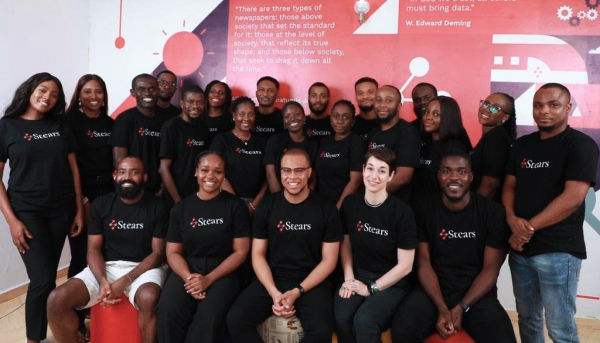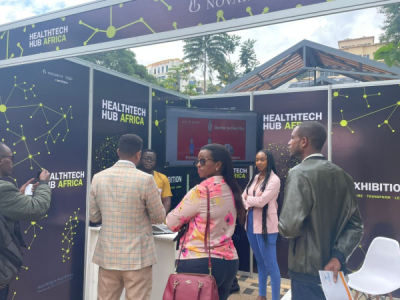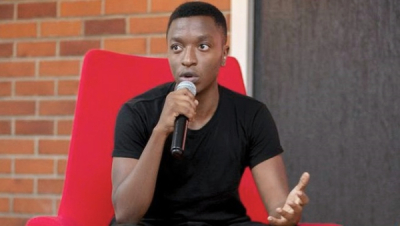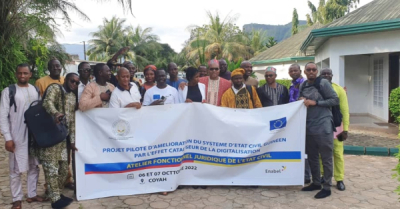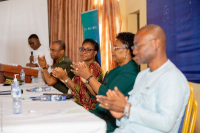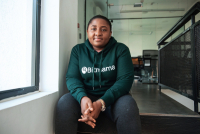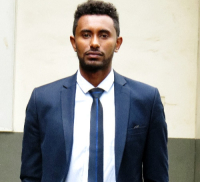The serial entrepreneur has founded three ventures, two of which are now defunct. These lessons learned were valuable for the young innovator who is still pursuing his tech adventure.
Dare Odumade (photo) is a Nigerian tech entrepreneur and innovator. He is also the co-founder and CEO of Chekkit Technologies Corp, a tech company leveraging blockchain technologies to protect consumers.
His tech company, launched in 2018, offers a blockchain-based mobile app that helps track food and medical products' production and distribution chain in the consumer and pharmaceutical industries. “Chekkit developed a technology of blockchain-powered unique identities for every product so OEMs, CMOs, and Brand owners can record the history and trace the journey of their products from manufacturing to the last-mile customer,” reads Dare Odulade’s Linkedin about section.
Thanks to its mobile app, Chekkit Technologies Corp allows consumers to authenticate products they purchase by scanning the unique QR code on the said products. Manufacturers also receive information on their products’ purchase history and read quality complaints. They can use the data to identify and end counterfeit chains early.
In September 2022, Chekkit Technologies Corp was selected as one of the 30 start-ups to benefit from the Bill & Melinda Gates Foundation's Investing in Innovation (i3) program.
Its CEO is a serial entrepreneur trained at the Meltwater Entrepreneurial School of Technology in 2017. In 2010 and 2015, he founded and co-founded a social network called StrictlyUI and a music streaming platform called Sharebunk App (both are defunct). He also has a professional experience in both the public and private sectors.
From 2013 to late 2014, he was the operations manager for the energy company Cannes Energy Nig. Ltd, a site supervisor for construction company Geei Designs and Constructions Nig. From September 2014 to July 2015, during his national youth service, he worked as a geophysicist for the Benue State Rural Water Supply and Sanitation Agency.
The tech entrepreneur is also a multiple award winner. In 2012, he was named an IT guru for StrictlyUI. In 2019, he received the award for the most innovative and best digital solution in Nigeria in the health sector at the United Nations World Summit Awards for Chekkit. With this recognition, he was able to sign partnerships with big tech firms like Cisco, Merck GmbH, Microsoft, and Facebook.
Melchior Koba
The news comes a month after the startup was selected to participate in the Google for Startups Black Founders Fund 2022.
Pan-African data intelligence company Stears announced Tuesday (October 11), the raise of US$3.3 million in its seed funding round. The round was led by MaC Venture Capital with participation from Serena Ventures, Serena Williams' investment company, and other investors.
“We know global professionals need our data and insight because banks, research firms, development organizations, and investors are already using our early products. Our customers tell us we are building a ‘systemically important’ company to address Africa’s data problem,” explains Stears’ CEO, Preston Ideh.
Stears was launched, in 2017, by three students who realized, by experience, that data and information about Nigeria, their country and Africa’s largest economy, were hard to come by. Combining their skills, they set up Stears to address this lack of information.
According to the CEO, the Stears website is the African version of Bloomberg and Thomson Reuters, two of the world's most trusted information providers. Stears identifies, combines, and markets the often missing, outdated, or poorly digitized data needed by traders, financial professionals, politicians, researchers, and even regulators.
In 2019, the team created Nigeria's first real-time election database, which was used by more than two million Nigerians to monitor the general election. After that experience, they raised US$650,000 in pre-seed funding.
With the resources raised during the seed round, Stears plans to collect data, perform in-depth analysis, and offer the analysis to their commercial customers in several ways beyond simply reported news. The company also plans to hire data scientists and analysts as well as industry analysts and expand in East and Southern Africa.
Samira Njoya
The second cohort is launched after the first of 30 startups from 10 African countries.
Pan-African healthtech accelerator HealthTech Hub Africa recently announced the launch of the second edition of the Africa HealthTech Challenge, a competition that awards and mentors Africa's most promising startups tackling local health challenges.
For this second edition, applications are open till October 22. The incubator will select 40 start-ups: 30 growth start-ups and 10 scale-ups. To be eligible for the challenge, applicants must focus on one or more of the following four thematic areas: cardiovascular health, breast cancer, virtual health and care, and optimizing data-driven decision-making.
They must also have teams of two or more full-time employees and be registered in an African country. “Teams consisting of both genders will be prioritized,” we learn. Growth startups must also ensure that they are not part of another accelerator program in the same year.
The 30 growth start-ups selected will benefit from a 10-month acceleration program that includes mentorship from two volunteer mentors for every start-up, coaching, and access to an interactive coaching platform, and invitations to networking events and hybrid events across Africa and beyond.
Apart from the acceleration program, scale-ups will also receive free access to world-class legal services, accounting, marketing, talent acquisition, accelerated fundraising, training, and media exposure.
The top three HealthTech start-ups will respectively receive US$50,000, 30,000, and 20,000 in grants from the Novartis Foundation.
Samira Njoya
Demand for big data is growing in several sectors given its ability to help improve efficiency. A Mauritian startup is using it to revolutionize SMEs’ marketing strategies.
Rwazi is a digital solution developed by a Mauritian eponymous start-up. It allows companies to track their competitors using various data collected on the ground.
The startup behind the app was founded by Joseph Rutakangwa (photo, right) in 2018 in Mauritius. But, it is also operational in Uganda, Zambia, and Rwanda.
Thanks to its mobile app and its part-time staff, it collects data on various brands, markets, and sales points. The collected data allow its customers to monitor the evolution of competitors’ pricing strategies in real-time, after due registration.
For Joseph Rutakangwa, “companies subscribe to activate the cycle where they want to optimize distribution.” “For example, you are Coca-Cola, and you subscribe for us to provide you a live feed on the availability, visibility, and pricing of Coca-Cola versus Pepsi in Lagos, throughout the year. With this, you list and restock at speed to increase market share,” he illustrated.
In addition to giving clients the ability to track various data in real-time, real-time analytics and predictions allow the said clients to decide when to adjust their marketing policy. Rwazi employs more than 20,000 mappers in 50 countries in Africa, South Asia, and the Americas to perform reliable and relevant analyses for its clients. It also works with more than 500 companies. "We give small and medium-sized businesses [...] direct access to [...] customers’ psychographic details that can help [...] determine how to best serve them,” the startup explains on its web platform.
Adoni Conrad Quenum
He ventured into entrepreneurship early, making a name for himself in Kenya. He currently runs his fintech startup, which earned him the trust of several international investors.
Geoffrey Mulei (photo) is the founder and CEO of Tanda, a fintech startup created to improve access to financial services in Africa.
Through the startup, founded in 2018, Geoffrey offers several digital products. They include Tanda Trader, an app that allows businesses to collect payments, sell their digital products, and offer loans. There is also Tanda Pocket, a virtual wallet with virtual cards to make purchases, and payments as well as manage budgets and finances. Another product is the Tanda I/O, an application programming interface (API) that helps third-party companies collect payments.
On October 4, 2022, the Kenyan tech entrepreneur secured additional financing from HAVAIC and several other investors. The funds aim to accelerate the development of Tanda products, extend the startup’s footprint in Kenya and enter new east African markets like Tanzania, Uganda, and Rwanda within 15 months.
“Our new products and growing distribution will open up opportunities for Tanda and our ecosystem partners to continue solving challenges for the majority of Africans locked out of the formal financial services ecosystem,” Geoffrey said in a release announcing the funding.
Tanda claims partnerships with 58 banks and savings and credit cooperatives, four telecom operators, 12,000 merchants and agents with over 300,000 unique clients served, and millions of shillings in transactions processed. It plans to extend its network to 100,000 merchants and agents in Kenya.
In 2016, its founder was one of the finalists of the Anzisha Prize. Before founding Tanda, he co-founded and led Inkisha -an eco-friendly packaging manufacturer and distributor- between 2015 and 2017. In 2017, he joined myLotto Kenya as the head of merchant sales, building a merchant network. Currently, he is a supply chain consultant for Think Delus Limited, a big data management consulting firm.
Melchior Koba
Guinea, like most African countries, is digitizing its public administration. With its digital civil registration system, the country intends to acquire reliable data that would facilitate sustainable planning and development.
On Wednesday, October 5, Guinea launched the pilot phase of its digital civil registration system in ten municipalities.
During a workshop, in Coyah, between October 6 and 7, communal authorities and representatives of the legal, health, and religious communities discussed the process.
"Currently, we are finalizing the first module of the platform. This module consists of the digitization of the existing records (birth, marriage, and death records), the creation of a civil registration index based on the existing records, and the development of a plan for the automatic registration and digitization of future vital civil events. We are gathered here to review the module before the official handover, in the coming days," said Djenabou Touré, coordinator of the project aimed at reforming and modernizing civil registration.
Guinea faces civil registration document conservation problems. Several documents were lost due to fire and vandalism. The country took several actions to address the problems. The actions include the development of a 2018-2022 National Strategy for the Reform and Modernization of the Civil Registry with support from the European Union (EU). Despite the actions, much remains to be done.
During the pilot phase, the country will create an application that will help digitize and secure various acts with QR codes and barcodes, among other tools. The documents will be indexed (using a month-to-month index) in a central repository. "There are also plans to migrate all the remedial birth certificates issued by courts but not yet transcribed by municipalities.[We] will also do the same in health centers,” indicated Michel Luypaert, team leader for DXC, the company developing the digital civil registration platform.
The digital civil registration project began in April 2021. It is funded by the European Union under the Emergency Trust Fund and implemented by the Belgian Development Agency (ENABEL). The project -scheduled for completion in March 2024- will be implemented in Conakry, Kindia, Mamou, and the Guinean consulates in Paris and Brussels during its pilot phase.
Samira Njoya
The project aims to, eventually, interconnect all of Benin's universities and research centers with regional and international networks.
In Benin, ten universities and academic centers can now communicate, exchange, and share educational resources through the Beninese Education and Research Network (RBER). The network was officially launched at the University of Parakou last Thursday, October 6.
According to the country’s Minister of Digital Transformation, Aurelie Adam Soule Zoumarou (photo, center), the RBER is now the largest fixed network in Benin. "The RBER is not just about the Internet. It is first of all a network that interconnects universities, allows the exchange of digital and educational resources, and enables users to move from one university [or academic center] to the other and enjoy the same services,” she said.
After the disruptions caused by the coronavirus pandemic during the academic year, the Beninese government decided to create a system that will facilitate access to information for more than 100,000 Beninese students with a broadband Internet connection, documentation, and online courses.
The first phase of the project was launched on June 30, 2022. Among other things, it enabled the construction of a campus network of 420 access points in lecture halls, laboratories, and offices. It also enabled the construction of two videoconferencing and IP telephony systems, the installation of a 1000 Mbps Internet network, and the deployment of 7,000 meters of optical fiber. The second phase of the project will integrate new services and add 12 universities to the interconnected network.
This first phase, which has just been completed, was implemented by the national information technology development agency (ASIN), under the supervision of the Ministry of Digitization. Active participants included the Ministry of Higher Education and Scientific Research stakeholders and universities.
The establishment of the Beninese Education and Research Network is in line with the government’s strategy to make the country an ICT leader in West Africa by digitizing every socio-economic sector.
Samira Njoya
Despite public authorities, associations, and organizations’ efforts, access to healthcare is still challenging in Africa. The various solutions developed by start-ups are proving to be interesting alternatives.
Appy Saude is a digital platform developed by an Angolan eponymous healteth startup. It allows users easy access to pharmacies and healthcare centers when needed. With its digital solution, the healthtech startup (founded in 2017) aims to quickly connect people to healthcare professionals, medicines, and information by leveraging digital tools.
“We are trying to improve accessibility to healthcare services using the digital tools we have available today. [...] Our vision is to connect everyone to our health service, which is what most NGOs and governments are working for,” said CEO and co-founder Pedro Beirao (photo, right) in 2021.
Through its mobile app (available for Android and iOS devices), users can create their accounts by providing the usual information: name surname, email, and password. Then they can access all the services offered by Appy Saude.
The app lists health and beauty products, clinics, healthcare centers, and laboratories. Users can view the feedback and ranks given by fellow users to healthcare centers, clinics, and laboratories. That way, they can choose which healthcare center to go to, based on other users’ experiences.
To reach a wider audience in Angola, the healthtech startup formed a strategic partnership with telecom operator Unitel. “In terms of expansion, we see mobile operators as an important part of our growth, and the digitization of health services. They have coverage everywhere, they are looking for solutions that people can use to access healthcare or other digital services, and they can help collect data on pharmacies and doctors on our open platform,” Pedro Beirao explains.
In 2019, Appy Saude successfully raised US$1 million to expand into Rwanda and South Africa. In February 2019, it was selected to present its solution at the Africa Startup Summit in Kigali. The following year, it won the ITU Virtual Digital World SME Awards.
This year, it is one of the 30 African start-ups selected to participate in the pan-African program "Investing in Innovation (i3)" funded by the Bill and Melinda Gates Foundation. On Playstore, its solution has already been downloaded more than 50,000 times.
Adoni Conrad Quenum
She is one of the few African women shaping the local cryptocurrency industry. With over six years in the industry, she has already garnered the trust of several investors.
Ruth Iselema (photo) is a trained pharmacist and founder of crypto company Bitmama Inc, launched in 2016. Her crypto company offers two products.
The first product is an eponymous mobile (Android and iOS) app that allows users to buy and sell cryptocurrencies, including Bitcoin, Ethereum, or Celo. The second one is Changera, “an International money transfer app that lets millions of people send and receive money in any currency around the world in a very fast, easy, and secure way.”
The name Bitmama comes from a combination of Bitcoin and mama. “I started learning about blockchain and cryptocurrencies earlier in 2015, through a friend and a couple of Telegram and WhatsApp groups I joined. Just as it is now, I turned out to be only one out of maybe two women in the space. Because most of the conversations happened online and we did not see one another physically, people assumed I was an elderly woman. So they started calling me ‘Bitmama’ — a combination of bitcoin and mama — and the name stuck,” she told Techpoint Africa.
The adventure started when she was scammed of NGN250,000 (about US$576) when trying to invest in cryptocurrencies. “Even though I did my due diligence, I still got scammed. So I decided this has to stop,” she explained.
In September 2022, Ruth secured US$1.65 million in funding to scale beyond Nigeria, Ghana, and Kenya. The funding was added to the US$350,000 she raised in October 2021. Thanks to the overall financing, she wanted to build "Africa’s most user-friendly, innovative blockchain company."
In 2018, she was one of the beneficiaries of the Green House Lab accelerator program organized by Venture Garden Group. Between 2017 and 2018, she was the director of the tech company Venhub. In late 2021, she made it to the media outlet Crypto Asset Buyer’s list of the Top 20 Individuals that shaped Nigeria’s blockchain & crypto industry that year.
Melchior Koba
His ongoing professional career is already rich with positions at national and international institutions. He combines that professional career with tech entrepreneurship allowing retailers to access FMCGs at favorable terms and competitive prices.
Dawit Nigusu (photo) is an Ethiopian software engineer and CEO of Shemach, an ecommerce startup he cofounded in 2020. His startup operates an eponymous B2B platform that allows retailers to order Fast-moving consumer goods (FMCG) from a wide variety of suppliers across the country either by paying directly or later. Shemach already claims more than 2,700 registered retailers on its platform, sourcing from eleven locally branded suppliers. In September 2022, it was selected to participate in the last cohort of the accelerator The Baobab Network for intensive training and was given a check of US$50,000 to finance its growth.
The CEO is a senior full-stack developer, since 2021, with the publishing company Scholastic Corporation. His professional career started in 2017 when he was a software engineering intern for the software company iCogs Labs.
In April 2018, he joined the University of Addis Ababa’s team as a junior software developer. He implemented several projects including the development of an online document management platform. The same year, he was hired by fintech company L-IFT, as a React Developer. Concurrently, he was also a software engineer for mobility startup ZayRide.
In June 2019, was recruited by the Food and Agriculture Organization of the United Nations (FAO) as a Senior Software Engineer in Ethiopia. A few months later, he was promoted to Senior Full Stack Web Developer with L-IFT. He also ventured into tech entrepreneurship by founding his e-commerce company. From August 2021 to January 2022, he was a software engineering consultant for the FAO.
Melchior Koba
More...
Five years after losing its first satellite, Angola announces the coming launch of Angosat-2, its second satellite delivered last July 26.
Angola will launch its second satellite, Angosat-2, built by Russia next Wednesday, October 12. The planned launch was announced, on October 4, by Mário Augusto da Silva Oliveira, the Angolan Minister of Telecommunications, Information Technology, and Social Communication (MINTTICS).
The satellite will be launched from the Baikonur Cosmodrome in Kazakhstan, through the Russian Federal Space Agency (Roscosmos). It is the result of the complementary protocol to the contract signed by Russia and Angola, providing for the construction of a replacement satellite in case of failure of the first Angosat-1 satellite, worth US$327.6 million.
According to the director general of Angola's National Space Program Management Office (GGPEN), Zolana João, Angosat-2 will be seven times faster than its predecessor Angosat-1, which was lost hours after its launch in 2017.
With a high data rate (HTS), providing 13 gigabytes in each illuminated region (satellite signal coverage range), the new satellite will cover the whole national territory and provide telecommunications services (telephony, Internet, telemedicine, broadcasting, and radio). It will cover the entire African continent, in particular Southern Africa, and will be based on the Eurostar-3000 platform with a 15-year design lifetime.
The launch of Angosat-2 is part of the 2016-2025 national space strategy that will contribute to unifying and developing Africa."We want to have a strong national space industry that serves the interests of our economy and brings benefits, not only for Angola but as a way to create synergies in our region while fostering the establishment of a united Africa," Minister Mário Augusto said.
Samira Njoya
Before going into digital entrepreneurship eight years ago, he built a solid professional experience in several fields, including energy, health, and banking. He is now contributing the lessons learned for digital inclusion both in and outside his native country.
Martin Stimela (photo) is a Botswanan entrepreneur and CEO of Brastorne Enterprises, an event tech company he co-founded in 2013.
Through Brastorne Enterprises, he developed three solutions that promote the digital inclusion of rural populations, who mostly cannot afford smartphones. The first solution is USSD mAgri, which allows farmers to sell their products and services nationwide, as well as access agricultural/market information, and short-term financing.
The second solution is Vuka USSD, a social network that enables “users on both low-end phones and smartphones to create profiles, add friends, create groups, chat & send in-person messages, group chats or broadcast messages.”
Then there is Mpotsa, a “question/answer platform that aims to provide users with information on almost everything” and receive valuable alerts.
“We literally enable the underserved to connect without the need for data plans. In simple sense, we’ve got technology that allows you to either use voice prompts or use a technology called USSD, which is mainly used for mobile money transactions here in Africa. It’s literally just text strings. But using that, you can actually connect to the internet, fetch data, and dumb it down, and bring it back, which is quite crucial to people who don’t have access,” Martin explained during a Stanford Graduate School of Business Grit and Growth podcast in 2021.
Currently, he is the Vice President of the Southern African chapter of the Stanford Seed program sponsored by the Stanford University Graduate School of Business. In 2019, he took part in the Alibaba eFounders Fellowship program that “provides first-hand exposure to ecommerce and digital innovations, and access to business leaders.” His professional career started in 2004, when he was recruited, as a business analyst, by British energy company E.ON UK. He later joined Lloyds Banking Group as a transformation project manager before his appointment, as project manager, by energy company RWE npower.
In 2011, he was hired by the Centers for Disease Control and Prevention, as the director of informatics. In 2012, Martin Stimela became the Chief Technology and Operations Officer of the Health Systems Strengthening Society. Then, the following year, he was appointed CEO of CIRA Energy. Concurrently, he kicked off his entrepreneurial journey with Brastorne Enterprises. In 2015, he was appointed executive director for enterprise support at the Botswana Savings Bank.
In Botswana, his company already claims more than 1 million users, “with 350k monthly users, and over 40% of active feature phone users on the Orange network.” In the Democratic Republic of the Congo, it claims over 800,000 users since its launch in May 2021. In September 2022, it was selected as one of the 60 African startups that will participate in the Google for Startups Black Founders Fund 2022.
Melchior Koba
In recent years, the number of streaming apps has shot up in Africa but local old-school songs are usually left out. A Congolese startup is offering an interesting solution.
Baziks is a digital solution developed by a Congolese eponymous startup. It allows Android users access to old and new Congolese songs. The startup behind the solution was founded by Baya Ciamala (photo) in 2016. However, it was incorporated in 2019 and launched to the public in 2021.
“Baziks is the first local music streaming app that aims to fight piracy and promote youth entrepreneurship. We support artists by educating the population and encouraging them to stop buying pirated MP3 music,” explains Baya Ciamala.
Once they download the Android app and register an account, they can browse the feature but they will not be able to listen to the available songs. They can listen to music by purchasing a subscription or buying the “pass miziki” via Orange Money. Its subscriptions range from US$0.15 (daily) to US$0.75 (weekly) and US$2.99 (monthly). Once subscribed, users can access and listen to the music index (with or without ads) and customize their interface.
The “Pass miziki” is a code card that allows access to the index and lets users listen to the songs on the platform. The daily pass costs US$0.1, while the weekly is US$0.7 against US$2.99 for the monthly. They can be ordered online and delivered (physical or electronic cards) for free anywhere in DRC.
There are also African songs on the platform but those by artists from the two Congos are predominant.
According to Play Store data, the app has already been downloaded more than a thousand times. In 2021, the start-up won the DRC edition of the Orange social venture competition, bagging a US$6,000 check.
Adoni Conrad Quenum
Cyber security has become a major concern for African states with accelerating digital transformation. As they cannot fight the threats alone, governments are betting on local and international cooperation.
The Ghanaian Cyber Security Authority (CSA), the Mozambican National Institute of Information and Communication Technology (INTIC), and the National Security Authority of Rwanda signed, Monday (October 3), a memorandum of understanding to fight cybercrime.
According to a speech read on behalf of Ghanaian vice president Mahamudu Bawumia, the memorandum provides for a range of activities including joint capacity-building exercises and cybersecurity training, and experience sharing.
“It also entails exchange programs for staff to promote capacity building and talent development in both countries and conduct of joint cybersecurity exercises, where countries involved will learn, share, and promote effective cybersecurity practices to ensure resilience and cyber readiness on both ends,” the speech informs.
Cybercrime and cybersecurity issues are major concerns in Africa. According to a study by Kenyan cybersecurity firm Serianu, African countries lost 10% of their cumulative GDP to cybercrime in 2021.
For Lourino Alberto Chemane, chairman of the board of Mozambique's National Institute of Information and Communication Technology, there is a need for countries to cooperate to address the cybersecurity challenges.
“Cyber security has no borders, and no single country alone can address cyber security challenge,” he added.
Samira Njoya



